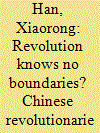| Srl | Item |
| 1 |
ID:
181855


|
|
|
|
|
| Summary/Abstract |
This article concentrates on the formation rather than the implementation of People's Republic of China (PRC)'s policies toward Tibet in the early 1950s. In particular, it examines the three stages of information gathering and policy consultation in the PRC's decision-making process regarding Tibet. It argues that before the People's Liberation Army (PLA) entered Tibet, the PRC leaders showed genuine respect for their advisers and took their suggestions seriously, even though not all of these suggestions were politically correct from the Communist perspective, and the advisers were also independent and free enough to express their opinions. After the PLA entered Tibet, PRC officials and PLA officers became investigators who were organized to collect information either for decision making or for justifying decisions that had already been made. These data collectors were no longer independent thinkers since they had to follow detailed and strict guidelines in conducting their fieldwork, and their primary task was not to give advice but to provide raw data. Some leaders now believed that they had learned enough about Tibet and therefore no longer needed to seek the opinions of the advisers. Meanwhile, some early advisers had lost their credibility by this time for political reasons. These factors combined to contribute to the suppression of dissenting views regarding Tibet and became one of the possible causes of the radicalization of PRC policies in some Tibetan regions, which prompted the revolt in the late 1950s.
|
|
|
|
|
|
|
|
|
|
|
|
|
|
|
|
| 2 |
ID:
179333


|
|
|
|
|
| Summary/Abstract |
This article analyses the roles and activities of three groups of Chinese communist revolutionaries in the early phase of the First Indochina War. The author argues that although the Chinese Communist Party (CCP) did not begin to provide substantial aid to North Vietnam until 1950, the involvement of Chinese communists, including members of both the CCP and the Indochinese Communist Party (ICP), in the First Indochina War started at the very moment the war broke out in 1946. Although the early participants were not as prominent as the Chinese political and military advisers who arrived after 1949, their activities deserve to be examined, not only because they were the forerunners of later actors, but also because they had already made concrete contributions to the Vietnamese revolution before the founding of the People's Republic of China and the arrival of large-scale Chinese military and economic aid. Moreover, interactions between early Chinese participants and the Vietnamese revolutionaries established a pattern that would characterise Sino–Vietnamese relations in the subsequent decades.
|
|
|
|
|
|
|
|
|
|
|
|
|
|
|
|